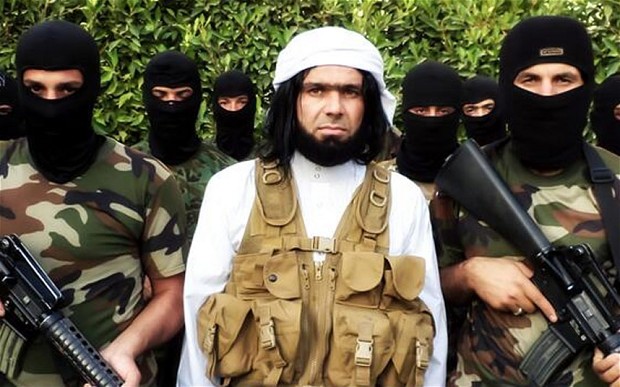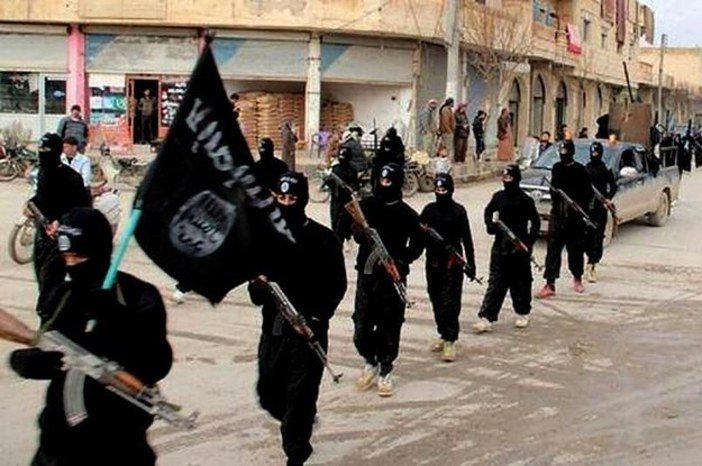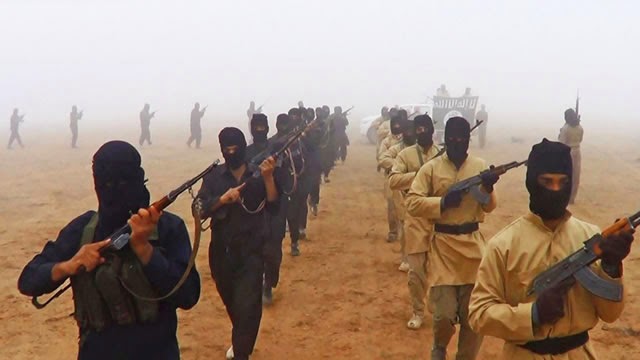12 Things You Need to Know about ISIS

Tracking the events in Iraq – in the whole region, actually – might be a colossal task. Particularly so during the summer, when it is sometimes even difficult to grasp a single headline.
We all are aware about something called ISIS – or IS, as of lately – that seems to be messing around from Lebanon to Iran. A group of bearded men who scare everybody, the only ones able to force Obama to reconsider his mantra of non-intervention and to make Assad look like a harmless puppy.
We’ve read about them, we’ve seen tons of maps showing their advance, we’ve heard rumours and conjectures. In case you’ve missed half of it, here are a few basic things you need to know about them. And yes, they are creepy!
1. What is Islamic State (IS)? What are the origins of its name (Arabic: الدولة الإسلامية, al-Dawla al-Islamiya)?
IS is an insurgent group formed by foreign fighters after the invasion of Iraq by American troops in March 2003. The militia was created as the “Islamic State of Iraq” by Al Qaeda to unite various militias in October 2006, during the occupation of Iraq by a U.S.-led international coalition.
The organization emerged under the name Jama’at al-Tawhid wal-Jihad (Monotheism and Community Jihad) but changed in October 2004 to Tanzim al-Jihad Qa’idat fi Bilad al-Rafidayn (Organization Base of Jihad in the Land of Two Rivers, TQJBR), colloquially known as “Al-Qaeda in Iraq”.
During its early years, the Islamic State of Iraq’s activity was mainly confined to Iraq. But with the Syrian conflict across the border and its first operations in the neighboring country, added an L to its name (Levant is how Syria is called in the Middle East). Its other name was “Islamic State in Iraq and al-Sham”. Its current name is “Islamic State” and represents the expression of an aspiration.
2. What is the relationship between IS and Al Qaeda?
It was Ayman Al Zawahiri, Osama Bin Laden‘a successor and Al Qaeda’s leader in Iraq, who ordered its creation. Last year, however, it was Al Zawahiri himself who ordered Al-Nusra Jabat, the other jihadist group affiliated with Al Qaeda, to fight against IS in Syria.
Amongst the reasons that pushed him to make such a decision, he cited that IS represented a threat to his leadership, that IS was waging its own war against other opposition groups instead of exclusively fighting against the regime of Syria’s Bashar al-Assad and, last but not least, the atrocities committed by its fighters in Syria (a little bit of an irony, if you allow me).
Abu Bakr al-Baghdadi, IS’ current leader, refused to bow to these demands, and accused Al Qaeda of not following the precepts of Islam. He accordingly ordered its militants to attack Al-Nusra in Syria. A multipolar war broke out and Assad, who had warned since the beginning of a terrorist threat, was strengthened.
3. Number of militants? Who else is helping IS?
It is difficult to assess the number of people who have sworn allegiance to IS, but different studies estimate that it amounts to at least 15,000 militiamen (or even more). Actually, many IS fighters were released from prison by the general amnesty declared by Assad in 2012.
IS has grown steadily thanks to the arrival of foreigners traveling to Syria to fight Assad’s regime. Estimates suggest that about 80% of foreign fighters in Syria are adhered to IS. Moreover, the effectiveness of IS’ military campaigns has convinced other groups and individuals to defect and join the group.
In Iraq, IS counts the support – or at least acquiescence – of other Sunni militias, especially of former members of the army and police, as well as receiving help from several tribal elements.

4. Where does the IS get its weapons from?
The capture of Mosul and Tikrit – together with the defeats of the Syrian regime – left IS with a remarkable quantity of military equipment: the humvees that America had sold to the Iraqi army, thousands of light weapons and ammunition and, by some accounts, even a helicopter (it would be the first time a non-governmental group in the region has air weapons).
Furthermore, and even if IS had not obtained these weapons, it now has piles of money to buy them; two months ago, it allegedly seized the Central Bank headquarters in Mosul. It is actually believed to be the richest terrorist organization in history.
Rumours have it that IS’ funds are channeled from the Gulf – from private donors or, according to malicious tongues, even from some states that will never admit to that. In addition to receiving foreign aid, IS controls the oil regions of Syria and part of Iraq’s oil fields (and is therefore able to levy substantial taxes).
5. Which territories does it hold by now?
It is important to remember that the situation on the ground changes by the minute. What is undeniable is that IS has created a de facto sovereign space, taking in a large swath of western Iraq and eastern and northern Syria.
The territory now under the control of IS, in whole or in part, is as large as about two thirds of Syria. It now controls a contiguous area of territory stretching from deep into western Iraq and including the cities of Mosul and Falluja, across the border into Syria, taking in the province of Raqqa, including its capital Raqqa City, and continuing until the border with Turkey. The movement has a presence as far as the southern suburbs of Baghdad.
Even though its goal is to establish a Sunni caliphate in the region of Syria, IS has recently expanded its operations to other countries in the area, such as Lebanon and Jordan.
6. How come IS has succeeded in controlling such a large territory with a limited number of fighters?
The main reason would be erratic behavior, inconsistency and weakness on the side of its rivals: IS was quite weak in Iraq a few years ago, but the reckless policies of Iraqi President Nuri Al-Maliki – sectarian politics marginalizing the Sunni minority and alienating the Kurdish – helped the group a great deal to reach momentum.
Military strikes by insurgent groups had already become the norm in a country weaker by the day, in a state where the population had started to be more afraid of the government than of IS itself.
In Syria, opposition groups fighting against the regime of Al-Assad have never been able to actually unite against their common enemy. While the Syrian rebels may be disunited and poorly organized, this is not true of IS – a disciplined, determined and ruthless force.
Another factor to take into account would be a clear and appealing ideology and effectiveness in reaching its goal: the truth is that, regardless of what will happen next, IS has already begun to establish an Islamic state.
It has, for instance, imposed its rules on Raqaa (Syria) and opened the border between Iraq and Syria in the areas under its control. This would explain why wealthy donors hoping to gain influence prefer to fund a radical but effective group over other more moderate groups that have not been as successful.

7. Are the situations in Syria and in Iraq alike?
While the civil war in Syria has forced the government to cede territories, in Iraq, the government had failed to maintain control of the concerning pieces of land even before the advance of ISIL.
The main evidence of this is the weakness of the (new and inexperienced, after being dismantled by the U.S. in 2003) Iraqi army, which instead of facing the IS militants who threatened Mosul back in June, ran away in terror.
8. What is IS’s strategy?
Last January, ISIS had already proclaimed an Islamic state in Fallujah. However, on June 29, 2014, to mark the beginning of the month of Ramadan, IS’s spokesman, Abu Mohamed al-Adnani announced the group’s intention to create a caliphate that would sweep across the Muslim world, and proclaimed Al-Baghdadi as its highest authority – “Ibrahim, Imam and caliph of all Muslims.”
IS has an ambitious five-year plan whereby it will expand its tentacles from the Maghreb to the gates of Spain, thus reviving Al Andalus and stretching it to Indian territory.
Some analysts believe that the immediate aim is not to control territories, but to first expand the conflict in other parts of Iraq and Syria, causing greater instability and strengthening its position, while the government is clearly weakened by the day.
IS sees its activities in Iraq and Syria as part of a single conflict. In January, the movement withdrew forces from outlying parts of Syria’s Idlib and Aleppo provinces and halted the fighting against the Kurdish YPG militia in the Kobani area.
In what has proven an incredibly wise move, IS was consolidating the western border of its soon-to-be-established state in order to focus on expanding the eastern border deep inside Iraq.
9. Who are IS’s enemies?
IS is currently fighting Kurdish militants, Syrian rebels, the Syrian army and the Iraqi army simultaneously.
Even though Maliki’s armed forces have performed atrociously, we cannot forget Iraq remains part of the Middle East’s single most powerful functioning alliance: the Iran-led regional bloc composed of Iran, Syria – where Assad seems stronger than ever – Iraq and Hezbollah (and sometimes of Hamas).
The U.S. decided last week to intervene – again – in the Arab country. Thus far, the majority of air strikes have targeted IS positions threatening Irbil, as an advance into pro-U.S. Iraqi Kurdistan would be considered an unacceptable outcome. Meanwhile, the West is too focused on Ukraine and remains clueless (surprise!) about what its next step could be.
Qatar seems comfortable in the shadows, most likely worried about being blamed of indirectly fanning what is now happening. Saudi Arabia is also one of IS’s staunchest rivals. The creation of a self-proclaimed caliphate in Iraq and Syria by IS is nothing but a direct challenge to the monarchy’s legitimacy, rooted on the relationship between the XVIIIth century alliance between Muhammad ibn Abdul Wahhab and the Saud family.
If there is a true caliph, that would make the King, Custodian of the Two Holy Mosques, and the House of Saud usurpers wrongly ruling Mecca and Medina.

10. What does IS do when it is control of an area?
As the world has been denouncing for weeks, the remnants of the ancient Christian community in Mosul has been forced to flee after IS told them they had to convert to Islam, pay a special tax or be killed.
Both Christians and members of other minorities fleeing claimed that after the attack, IS gave them a few hours to choose between two options: to develop and accept a more extreme version of Islam or “face the sword.”
In the territories it dominates, the organization imposes its extremist interpretation of Sharia law, carrying out public executions and destroying temples and mosques, including – amongst others – the tomb of the prophet Jonáh.
Amnesty International has reported “torture and summary execution”. Syrians have been arrested for crimes such as smoking cigarettes, practicing zina (sex outside marriage) or belonging to a rival armed group.
11. What about the Kurds? What about other minorities?
In the outset, some commentators affirmed IS would leave Iraqi Kurdistan alone, but everything suggests the area is seriously threatened by the advance of IS, which is already at the gates of Erbil, capital of the autonomous region.
The sad truth is that the only stakeholder that so far seems able to restrain IS are the Kurdish militias. In Syria, the Kurds have been the only ones that have achieved significant victories against both them and the regime. And many parallels may be drawn between both scenarios.
Even though relations between the Kurdish Regional Government in northern Iraq and the Kurdish Democratic Union Party (PYD)’s three areas of control in northern Syria had worsened in recent months, the IS’s offensive appears to have repaired terms between them, and the cross-border Islamist entity is facing a renewed Kurdish alliance to its north.
Members of other sects and ethnic groups denounced as Shia or polytheists are being persecuted, imprisoned and murdered. The plight of the yazidis is now sadly famous, but that doesn’t make it less true. In recent weeks the militant group has destroyed many places of worship of the Shia, Christian, Sufi and Yazidi communities, as well as any other opposed to the radical interpretation of Islam by the group.
12. What now? Is the rest of the region in danger?
The result of all this cannot be known. The reality is one of sectarian war – an unwanted consequence of the cold war Saudi Arabia and Iran have been waging for years – over the ruins of Iraq and Syria.
Maliki is struggling to form a new government following the parliamentary elections in April. And some amongst his alleged allies – namely, the U.S. and Iran – have already suggested he should step down in order to shape a more inclusive government. And it seems in the end, Iraqis will have a new Prime Minister, Haider Al-Abadi.
Some believe IS is creating more rivals than allies and that, eventually, the tide will turn against them. Iraq’s Shia majority is taking comfort from a belief that IS is actually weak and can be easily discarded by Sunni moderates once they’ve achieved their goal – having a say in the future of the country.
Let’s just hope IS leaders are not reading about this everywhere, do not get too strong and are not waiting for their Sunni allies to betray them. If not, they are screwed. And, just as it happens in Syria, the fear of future retaliation might make it is less likely for the Sunnis to rise up in opposition to IS and its Caliphate.
The moment is passing when the non-IS opposition could successfully mount a challenge. An imminent battle for the capital after the fall of Mosul hasn’t happened yet as IS has yet to consolidate its hold on the territory it has just conquered.
And don’t count on the jihadis’ clemency, for their ideology is based on killing or expelling infidels – i.e. Shia – rather than negotiating with them.
That leaves both the West and its regional allies – especially Saudi Arabia, Qatar and Turkey – with a serious dilemma: their official policy is to get rid of Assad, but if the latter is routed by IS, who will be able to stop the jihadis?
The West should also take care of the belief that IS is interested only in “Muslim against Muslim” struggles, for the movement has declared and shown it will fight anybody who doesn’t adhere to its puritanical variant of Islam.
Do they represent an imminent danger to neighboring territories? In spite of their success and their appealing ideology, a group with these characteristics needs deep roots in an area where it looks forwards to staying and ruling.
It is difficult to make such progress in countries like Lebanon, where the multi-faith nature of society and its class structure limit the number of potential jihadists to low-income or marginalized sectors of the Sunni community.
Or even Jordan, where they can attract only dozens of people among the vast underclass that is concentrated in the metropolitan areas.
Even in Syria, where IS seized its first extensive territory, it is still considered an outside force whose local commanders are not Syrian and shouldn’t stay on the ground for long.
WE SAID THIS: Don’t miss What You Need to Know about the Gaza-Israel Crisis.
